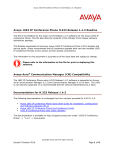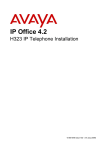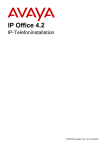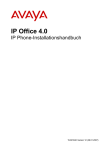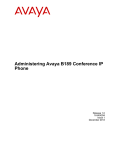Download Avaya H.323 User's Manual
Transcript
Avaya 1692 IP Conference Phone H.323 Release 1.4 Readme – Release 2
Avaya 1692 IP Conference Phone H.323 Release 1.4 Readme
This file is the Readme for the Avaya 1692 IP Conference Phone H.323 Release 1.4. This file
describes the contents of the March 2012 Generally Available software distribution
package.
This Release supersedes all previous Avaya 1692 IP Conference Phone H.323 releases and
service packs. Avaya recommends that all customers upgrade both new and installed 1692
IP Conference Phones to this version at their earliest convenience.
To upgrade your 1692 IP Conference Phone:
1.
Unzip the zip file in the root directory of your HTTP server.
2.
Make any adjustments required by your environment to your 46xxsettings.txt
file.
3.
Reset your 1692 IP Conference Phone.0.
Avaya Aura ® Communication Manager (CM) Compatibility
Although the 1692 IP Conference Phone is supported on Avaya Aura® Communication
Manager 4.0 and higher, we recommend using the latest Communication Manager release
with this model. See the “Communication Manager Software & Software Compatibility
Matrix” at http://support.avaya.com for the supported software/software versions of the
Media Server, Media Gateway, and circuit packs.
CM 4.0 and above is required to support the following features:
Setting Codecs G.711, G.722
SRTP
Feature buttons on a softkey
The 1692 IP Conference Phone supports only AES for SRTP (the 1692 does not support
signaling encryption).
The 1692 is not natively supported. It is recommended that the 1692 be administered as a
4620SW.
For more details refer to the H.323 configuration section in the Communication Manager
Administration Guide which can be downloaded from http://support.avaya.com.
Additional installation information is provided in the Avaya 1692 IP Conference Phone Quick
Start Guide which can be downloaded from http://support.avaya.com.
Copyright Avaya 2012 All rights reserved
Page 1 of 11
Avaya 1692 IP Conference Phone H.323 Release 1.4 Readme – Release 2
Enhancements with H.323 Release 1.4
Administrative related capabilities:
Gatekeeper list – Support for configuration of Gatekeepers through
DHCP/46xxsetting.txt file (MCIPADD) and CM (RAS Gatekeeper lists). The existing
functionality has been expanded to allow up to 7 addresses for MCIPADD, and up to
23 addresses from Communication Manager. This increases the flexibility and
reliability of the telephone to find alternative Gatekeepers in cases of network or
equipment outages.
Controlled access to configuration parameters – Allows administration of local
Mute Key Sequence procedures depending on the values set using the parameters
PROCPSWD and PROCSTAT settings. This improves security by allowing
administrators so customize access to Local Procedures.
GET filename – Support for use of “GET filename” command in the 1692upgrade.txt
and 46xxsettings.txt files. This gives administrators some flexibility in assigning
different parameter values to different telephones or different user communities.
SNMP-MIB support for newly added features/variables.
Improved interworking with Communication Manager:
Registration Request (RRQ) – Support for software version,
vendormanufacturerCode and callPresent reporting in RRQ message in CM acceptable
prescribed format. The first two changes provide more information to
Communications Manager for station management. The third change improves the
speed and reliability with which the phone can fail over in case of a network or
gatekeeper outage.
Unnamed Registration/Terminal Translation Initialization (TTI) – Support for
Unnamed Registration/Terminal Translation Initialization (TTI). “Unnamed
Registration” is when the telephone registers to Communications Manager with a null
extension and password. This can be useful for telephones before they are assigned
extensions, or when a user has taken over the extension of phone A while at phone
B. The telephone that has registered with a null extension and password has only
one call appearance, no feature buttons, and is given service by Communications
Manager at the level of any TTI-administered telephone. Note that for Unnamed
Registration to work, both the IP Conference Phone and Communications Manager
must be administered to allow it.
Unregistration Requests (URQs) – Support for URQ messages with reason codes.
This improves security (since the telephone takes extra precautions to validate the
URQ message) and can aid problem solving in that the telephone provides detailed
messages explaining why the phone unregistered.
Load balancing - Support for load balancing. With basic registration, potentially all
H.323 IP telephones would attempt to get service from the same Gatekeeper, even if
dozens of other Gatekeepers are available. Communication Manager Gatekeepers
have long had the ability to “direct” registering telephones to other Gatekeepers that
are under-utilized (hence improving availability and speed of registration by
‘balancing the load’ across multiple Gatekeepers). With Release 1.4, the 1692 IP
Conference Phone no longer ignore this direction, but instead complies with it.
Copyright Avaya 2012 All rights reserved
Page 2 of 11
Avaya 1692 IP Conference Phone H.323 Release 1.4 Readme – Release 2
Avaya 1692 IP Conference Phone H.323 Release 1.4 Package
Content
The release package contains all the files necessary to upgrade Avaya new or previously
installed 1692 IP Deskphones to Release 1.4.
The following files are included in the release package:
1692_014000.bin
(application file)
Bootrom.ld
(boot file)
1692upgrade.txt
(Avaya upgrade script file)
000000000000.cfg
(XML file required for BootServer process)
sip_backup.cfg
(Required for TLS and Localization)
phone1_vcvr.cfg
(Required for TLS and Localization)
1692Localization folder containing supported language folders.
o
o
o
o
o
o
o
o
o
French_Canada
French_France
German
Italian
Spanish
Chinese
Japanese
Portuguese
Russian
av_prca_pem_2033.txt
av_csca_pem_2032.txt
av_sipca_pem_2027.txt
av_sipca_pem_2011.txt
release.xml
(Avaya Product Root CA certificate)
(Release content in .xml format)
The signatures in the signatures subdirectory of the .zip distribution package are only intended to
be used by the file server, and the file server that is on the CM 6.x Utility Server is the only file
server that currently support this.
System specific parameters should be entered into the 46xxsettings.txt file which is
available for separate download at http://support.avaya.com
Note that the “sip_backup.cfg” and “phone1_vcvr.cfg” files are required for TLS and
Localization with the 1692 H.323 offering. These files must be present with every upgrade
package.
The upgrade procedure requires that all files be placed in the file server folder.
The IP Conference Phone H.323 Release 1.4 package is available in the following versions:
1692-IPT-H323-R1_4-030712.zip
1692-IPT-H323-R1_4-030712.tar
Copyright Avaya 2012 All rights reserved
Page 3 of 11
Avaya 1692 IP Conference Phone H.323 Release 1.4 Readme – Release 2
Issues resolved with H.323 Release 1.4
Issues resolved in this release include:
WI/SSIP
number
Issue
SSIP-8499
No audio path after CM reset while shuffling is enabled.
SSIP-8686
1692 phone sends GRQ to AGK list IP's in case of login attempt through
unnamed registration Login Softkey.
SSIP-8681
1692 does not display the current active Gate keeper Address in SysInfo
when it is registered to alternate Gate keeper.
SSIP-8678
Sometimes even with extension availability phone is performing
Unnamed Registration request.
WI00961964
SSIP-8676
SR 1-2228964572 1692 phone running software 1.3 or 1.31 losses audio
path when the CM Server with processor Ethernet is interchanged.
wi00974599
SSIP-8690
Newly logged in conference phone, 1692, does not show the
administered button-labels.
SSIP-8663
Mute key, Volume Up and Volume Down keys are not working in active
call when CM Server with processor Ethernet is interchanged.
SSIP-8667
Add support for GET filename command.
SSIP-8424
VLANTEST 0 does not result in correct phone behavior.
SSIP-8662
PROCSTAT and PROCPSWD features support in 1.4.
wi00969714
SSIP-8683
SR 1-2295357067 1692 phones reset the TCP connection
SSIP-8625
Auto-icom server feature displayed wrongly on phone.
SSIP-8624
Phone did not sent Release complete message in extension take over
scenario.
SSIP-8603
Phones are not rebooting when do busy out/release station/port using
CM6.0
SSIP-8312
Two Phones are getting register with same extension when unnamed
registration is enabled on CM.
Copyright Avaya 2012 All rights reserved
Page 4 of 11
Avaya 1692 IP Conference Phone H.323 Release 1.4 Readme – Release 2
SSIP-8452
1692 ignores language settings in the station form and uses default.
SSIP-7960
Phone is unable to go to unnamed registration state.
SSIP-8665
1692 phones are rebooting during calls in 1.32 software.
SSIP-8575
1692 phone does not follow load balancing.
SSIP-8532
1692 does not reboot via CM reset ip-stations command
SSIP-8264
The station doesn't get the correct settings from the IP-NETWORKRegion (CoS settings)
SSIP-8498
Phone screen does not display properly in ideal state after conference
call with reset system 4.
SSIP-8597
1692 phones cannot be loaded with new software remotely.
SSIP-8630
Phone is sending GRQ request and register back with CM again.
SSIP-8589
1692 Reregisters, drops call and unregister with TTI enabled.
SSIP-8635
1692 dropping active call.
SSIP-8637
1692 not trying the LSP in failover scenario.
SSIP-8531
Remote reset of the 1692 results in the phone freezing.
SSIP-8570
Phone displays the "No File server Address * to program" message even
when it gets file servers IP from DHCP when do Mute Restart after Mute
RESET.
SSIP-8301
Server feature cursor does not get updated when remove few features
from ACM while the phone is registered to it.
SSIP-8373
Team button is displayed as {Null}, if logoff and login the phone after
adding this server feature.
SSIP-7649
Gatekeeper Request (GRQ) Issue-:
Phone is not sending GRQ request in consistent time gap, when it goes in
discovery mode.
Note: Phone functionality does not have any impact and is more of a
statistical observation.
Copyright Avaya 2012 All rights reserved
Page 5 of 11
Avaya 1692 IP Conference Phone H.323 Release 1.4 Readme – Release 2
SSIP8323/SSIP7800
Redial Key is not retaining the last dialed number call made by Directory
feature.
SSIP-7730
Need to do Mute sequence two times to get the required screen in
certain scenario.
SSIP-8309
'Password error' and 'Extension in use' message for all the supported
languages other than English is not properly translated.
SSIP-8311
Phone hangs in extension take over scenario and required hard reboot to
make operational.
SSIP-8312
Two Phones are getting registered with same extension when unnamed
registration is enabled on CM
SSIP-8251
1692 is not taking DIFFSERV/TOS PARAMETERS in the network region
from CM
SSIP-7961
Phone is showing "Resource Unavailable" when registered with a CM with
CLANS configured.
SSIP-8314
Phone does not display the ringing call on the phone UI when phone is
on log off screen
SSIP-8315
Phone displays two feature is highlighted at the time on the screen.
SSIP-8318
SSIP-7715
(Linking
issue)
Phone does not generate the error tones.
SSIP-8319
Phone always contact to last ip address given in the list.
SSIP-8340
Sometimes phone hangs on the login screen in a particular scenario.
SSIP-8409
Phone doesn't return to ideal state after conference call while one call is
dropped by 1692
SSIP-8264
The station doesn't get the correct settings from the IP-NETWORKRegion (CoS settings)
SSIP-8575
1692 phone's does not follow load balancing.
SSIP-8579
1692 does not support TTI/Unnamed registration
Copyright Avaya 2012 All rights reserved
Page 6 of 11
Avaya 1692 IP Conference Phone H.323 Release 1.4 Readme – Release 2
SSIP-8542
Discovered new vlan configuration screen sometimes is displayed
momentarily at the booting up screen when L2QVLAN and L2Q set in
settings file and Vlan Name TLV is defined.
SSIP-7840
Phone does not attempts to contact all the next DNS Server in the list as
defined in DHCP when the first DNS server responds back with "no such
name" message.
Note: Working as per the DNS standard specification. 1692 is designed
as per that specification.
SSIP-8324
Phone accepts more than 13 digits on the dialing screen
Copyright Avaya 2012 All rights reserved
Page 7 of 11
Avaya 1692 IP Conference Phone H.323 Release 1.4 Readme – Release 2
Unresolved issues in H.323 Release 1.4
WI/SSIP
number
Issue
SSIP-8689
Oasis 1692: When user goes off-hook and then starts accessing
Menu>>Ringing Patterns (without dialing any number) simultaneously
listening the ring tones while dial tone is being played out notices an
increase in dial tone volume.
Note: Corner scenario of an issue trivial in nature and will not fix in
R1.4 cycle.
SSIP-8256
Phone is retaining the Time server IP even if that parameter is deleted
from the DHCP server.
Note: Phone functionality does not have any impact as this is not a
mandatory parameter. Phone anyways takes time from ACM.
SSIP-8295
LLDP: Phone is not losing its connectivity with the CM if change the
VLAN in Network policy TLV and remains registered after dropping the
call.
Note: Phone functionality does not get impacted.
SSIP-8304
Phone is not displaying the 802.1x Failure screens if disabling the ID
on the authentication server when in Restart confirmation screen.
Note: More of a cosmetic issue and also a rare scenario where a phone
successfully authenticated to the 802.1x server with EAP ID and
password is disabled only when the phone is in Restart confirmation
screen.
SSIP-8535
Phone displays enter extension screen if do Mute ADDR# after
authenticating the phone with a different 802.1x user id and password.
wi00973379
SSIP-8685
1-2307490335 / PEA 1-12BDE27 - SET HTTPDIR not retained during
boot up
SSIP-8684
SR 1-2316459151 1692 phone - language files not downloaded when
using https as fileserver type
SSIP-8252
1692 is not taking signalingChannelRecovery values from CM ipnetwork region form
SSIP-8247
1692 with software version R1.0 1692 is drawing the maximum power
on a POE switch and that its class type not identifiable.
SSIP-7963
Phone is getting a GRJ with a Reject Reason "Security Denial" during
registration with definite configuration on ACM
Copyright Avaya 2012 All rights reserved
Page 8 of 11
Avaya 1692 IP Conference Phone H.323 Release 1.4 Readme – Release 2
SSIP-7959
Phone shows confusing messages.
wi00974613
SSIP-8691
The 1692 (1.31) phones are showing the auth code after a redial on
the screen.
wi00979512
SSIP-8698
Phone goes to 'Unnamed Registration' after pressing and deleting one
dial-pad button in EXT prompt and leaves for one minute.
wi00979516
SSIP-8699
The 'unnamed registration' timer resets if pressing button other than
'0-9 or #'.
wi00974841
SSIP-8693
1692 does not work with Unicode setting on CM station page.
Advisement – Upgrades/Downgrades to/from H.323 Release 1.0
Upgrades from H.323 Release 1.0 and H.323 Release 1.3 or later using HTTPS will fail due
to changes in the default port from 443 to 411.
Workaround:
Change TLSPORT via DHCP-SSON and set explicitly to 411.
Upgrade from H.323 Release 1.0 to Release 1.2. Perform MUTE Clear on Release 1.2,
use a static IP address and then upgrade to Release 1.3 or later.
When downgrading to H.323 Release 1.0, an “Error loading <mac>.cfg” error is displayed.
Workaround:
Reboot the 1692 and re-enter the IP address.
Copyright Avaya 2012 All rights reserved
Page 9 of 11
Avaya 1692 IP Conference Phone H.323 Release 1.4 Readme – Release 2
License Agreements
Notice
While reasonable efforts were made to ensure that the information in this document was complete and accurate at
the time of printing, Avaya Inc. can assume no liability for any errors. Changes and corrections to the information in
this document may be incorporated in future releases.
Documentation disclaimer.
Avaya Inc. is not responsible for any modifications, additions, or deletions to the original published version of this
documentation unless such modifications, additions, or deletions were performed by Avaya.
Link disclaimer
Avaya Inc. is not responsible for the contents or reliability of any linked Web sites referenced elsewhere within this
Documentation, and Avaya does not necessarily endorse the products, services, or information described or offered
within them. We cannot guarantee that these links will work all of the time and we have no control over the
availability of the linked pages.
License
USE OR INSTALLATION OF THE PRODUCT INDICATES THE END USER’S ACCEPTANCE OF THE TERMS
SET FORTH HEREIN AND THE GENERAL LICENSE TERMS AVAILABLE ON THE AVAYA WEBSITE AT
http://support.avaya.com/LicenseInfo/ (“GENERAL LICENSE TERMS”). IF YOU DO NOT WISH TO BE BOUND BY
THESE TERMS, YOU MUST RETURN THE PRODUCT(S) TO THE POINT OF PURCHASE WITHIN TEN (10)
DAYS OF DELIVERY FOR A REFUND OR CREDIT. Avaya grants End User a license within the scope of the
license types described below. The applicable number of licenses and units of capacity for which the license is
granted will be one (1), unless a different number of licenses or units of capacity is specified in the Documentation or
other materials available to End User. “Designated Processor” means a single stand-alone computing device.
“Server” means a Designated Processor that hosts a software application to be accessed by multiple users.
“Software” means the computer programs in object code, originally licensed by Avaya and ultimately utilized by End
User, whether as stand-alone Products or pre-installed on Hardware. “Hardware” means the standard hardware
Products, originally sold by Avaya and ultimately utilized by End User.
License Type(s):
Designated System(s) License (DS). End User June install and use each copy of the Software on only one
Designated Processor, unless a different number of Designated Processors is indicated in the Documentation or
other materials available to End User. Avaya June require the Designated Processor(s) to be identified by type,
serial number, feature key, location or other specific designation, or to be provided by End User to Avaya through
electronic means established by Avaya specifically for this purpose.
Copyright
Except where expressly stated otherwise, the Product is protected by copyright and other laws respecting
proprietary rights. Unauthorized reproduction, transfer, and or use can be a criminal, as well as a civil, offense under
the applicable law.
Third-party Components
Certain software programs or portions thereof included in the Product may contain software distributed under third
party agreements (“Third Party Components”), which may contain terms that expand or limit rights to use certain
Copyright Avaya 2012 All rights reserved
Page 10 of 11
Avaya 1692 IP Conference Phone H.323 Release 1.4 Readme – Release 2
portions of the Product (“Third Party Terms”). Information identifying Third Party Components and the Third Party
Terms that apply to them is available on Avaya web site at: http://support.avaya.com/ThirdPartyLicense/
Trademarks
Avaya, Avaya Aura, Communications Manager and the Avaya logo are registered trademarks and/or service marks
of Avaya Inc. in the U.S. and certain other jurisdictions.
All other trademarks are the property of their respective owners
Copyright Avaya 2012 All rights reserved
Page 11 of 11












